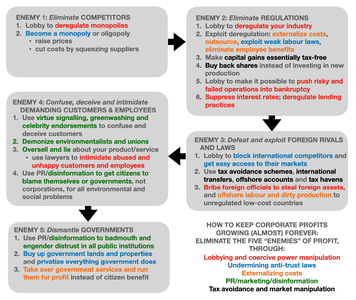When people talk of "market forces" way too many things can be meant or perhaps wrongly "understood" by the phase, due to ideology. I like market forces of the Adam Smith meaning and context of his ideas. We do not have that. I like an ideal of capitalism, but it's something like the supposed quote of Churchill about democracy: worst form of government, except for all the others.
Very much before, and now to totality with the last election, wealth and income disparity radically beyond any rational, justifiable reason represents an internal breakdown of the idea of the true free market, destroys democracy, and is perhaps the second most important policy discussion, after global warming--if and when we might ever have politicians in office who can begin to address it. CEOs that make 1500 to 2000 times their lowest paid workers is one reflection of this (in the sixties it was occasionally as high as 300 times). These nonsensical disparities and an array of others reflect that the old ideas of capitalism--as functionally providing most people with choice in quality and price and better goods and services--have been fatally damaged by a kind of anarcho-capitalism. One that does not feature such choices, but replaces them with focus on profit based on unfair elimination of fair business competition, unchecked "externalities" which hurt the public, and then reductions quality of goods and services, and necessarily to all of these, reductions in the autonomy and democratic participation of average people.
The focus on-and-only-on profit, and then simply moving money around for profit functions as a permanent and immovable driver of these negative elements for the public. The other essential ingredient is that as the costs of living skyrocket to increase these profits, services cost beyond capacity to pay, resulting in insurance profits built to not pay in endless ways to also increase profits. Wages are anchored down to absolute minimums for average workers, to allow for CEO pay increases. Politicians are funded to increase supports for all of this. Primary threats to safety, freedoms and basic rights to individuals comes not from the ordinary market forces of capitalism,but from this higher level of functional anarcho capitalism and oligarchy in the last 60 years or so. It has and is rapidly taking a stranglehold on power and permanency via corporate power in collusion with government. The socio-political nuclear reaction that begin this is the Citizen's United ruling, but I will not digress on that here.
Capitalism of a true Adam Smith, or even Robert Nozick variety, dead now, could have only survived by being subjected to democratic restraints as the electorate sees fit. With the collusion we see the electorate, and thus all average workers are neutered into manipulated wage slaves--what Chomsky has called "atoms of consumption." The Trump voters are happily in this place. There comes a point in which totally unchecked capitalism consolidates power to the anarchic degree that it in fact destroys capitalism's low level benefits to the average person, market choice is gone, and hurts them ever as needed to increase profits, and they are as irrelevant as atoms that make up a factory machine.
This kind of distinction in the examination of the actual problem is beyond the understanding of people raised into a conservative ideology, due to basic ignorance and to the blindness of emotional attachment to a simplistic and now false notion of free markets the likes of which no longer real due to collusion of politicians, large corporations and the hyper rich.
A useful chart organizing the problem:







